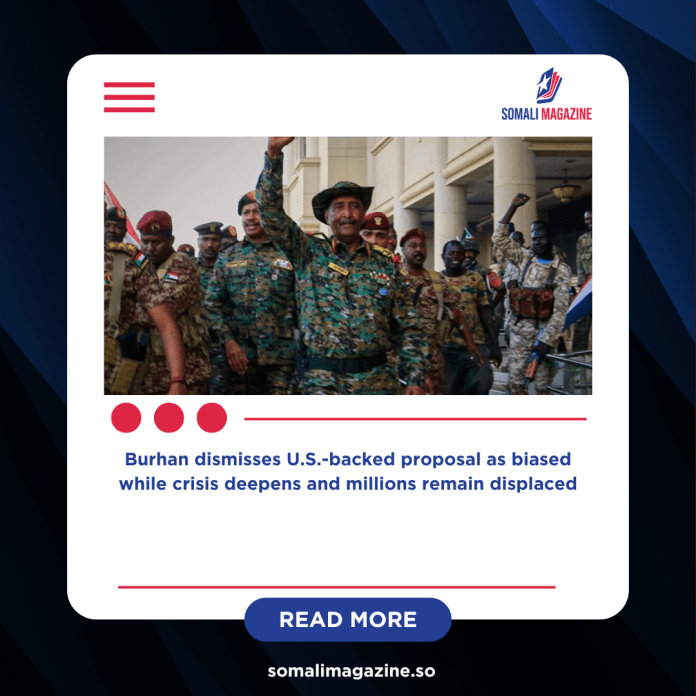Facebook Twitter (X) Instagram Somali Magazine - People's Magazine
Sudan’s top military leader, Gen. Abdel-Fattah Burhan, has rejected a new ceasefire plan presented by U.S.-led mediators, dealing a major setback to ongoing efforts to end the country’s devastating war. In a video released by the Sudanese military on Sunday, Burhan said the proposal was unacceptable, calling it “the worst yet,” and accusing the mediators of being biased in favor of the rival Rapid Support Forces (RSF).
The war in Sudan began in April 2023 after a long-simmering power struggle between the national army, led by Burhan, and the paramilitary RSF erupted into full-scale fighting in Khartoum and other regions. Since then, the conflict has killed more than 40,000 people, according to United Nations estimates, although humanitarian groups believe the true number is far higher. The war has forced over 14 million people from their homes, created widespread hunger, fueled disease outbreaks, and triggered what the U.N. describes as the world’s largest humanitarian crisis.
For more than two years, a mediation group known as the Quad — composed of the United States, Saudi Arabia, Egypt, and the United Arab Emirates — has attempted to bring the warring sides to an agreement and restore a path toward Sudan’s democratic transition, which was disrupted by a 2021 military takeover. Despite these repeated efforts, progress has been slow and repeatedly derailed.
The latest proposal put forward by the mediators calls for a three-month humanitarian truce, followed by nine months of political negotiations aimed at designing a long-term settlement. According to U.S. adviser for African affairs Massad Boulos, who spoke to the Associated Press earlier this month, the plan was designed to ease suffering, allow aid access, and bring both sides back to the negotiating table.
The RSF announced that it accepted the truce, especially after global outrage over atrocities reported in the Darfur region, particularly in the city of El-Fasher. RSF commander Gen. Mohammed Hamdan Dagalo reaffirmed the group’s support for a temporary ceasefire on Monday and urged mediators to pressure the military leadership to accept the proposal.
However, Burhan strongly rejected the plan, saying it undermined the Sudanese Armed Forces by dissolving key security institutions while allowing the RSF to stay in their current positions inside civilian areas. He argued that no agreement was possible unless the RSF fully withdrew from towns, neighborhoods, and homes, allowing displaced civilians to return safely. Only then, he said, could political talks begin.
Burhan also criticized Boulos personally, accusing him of trying to impose conditions on Sudan’s military. He warned that the mediator could become “an obstacle to the peace that the people of Sudan seek,” though he did not share specific details about his concerns.
He further accused the United Arab Emirates of supporting the RSF — an allegation that rights groups and U.S. intelligence officials have repeated in recent months. The UAE, which denies assisting the paramilitary forces, responded sharply. In a statement, its Foreign Ministry said Burhan’s rejection of the ceasefire proposal amounted to “obstructive behavior” that must be addressed.
The United Nations continues to push for an immediate end to the violence. On Monday, U.N. Secretary-General António Guterres called for a ceasefire, urging both sides to return to negotiations, allow humanitarian aid to reach civilians safely, and stop the flow of weapons and fighters into Sudan. “We need peace in Sudan,” he wrote on X.
Despite mounting international pressure and growing humanitarian needs, Burhan insisted the military would not accept any arrangement that threatens its role or allows the RSF to maintain its presence in civilian areas. He said the army does not reject peace but will not accept threats or external dictates.

